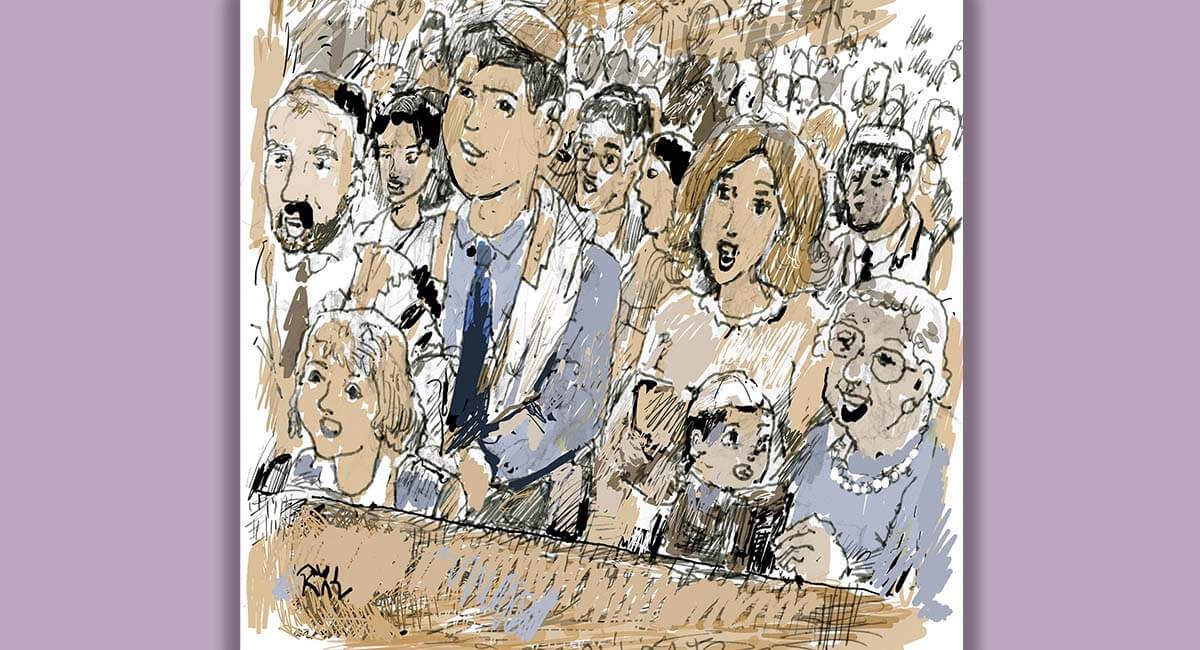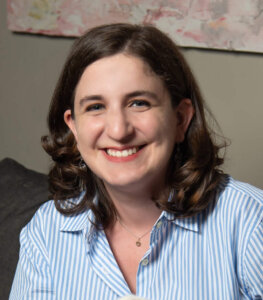My non-Jewish husband doesn’t fast for Yom Kippur. We spend the day in shul together anyway
Jews are heading into a new year. But our non-Jewish family members are heading into a new season with us, too.

An illustration of the author and her husband during Yom Kippur services Illustration by Avi Katz
“This was such a nice day,” my husband said the evening after Yom Kippur last year.
I laughed. My husband is not Jewish. Though he had taken off work and gone to services with me, he had not fasted. Of course it had been a nice day for him!
As we head into this year’s High Holidays, though, I’ve been thinking about that moment, and my reply, and why it was perhaps too glib.
My husband and I don’t have children yet, which is to say that I’m not trying to model behavior for anyone in my home. I’m just trying to observe these particular days in a way that feels right, and he is coming along with me as I do that.
Being Jewish, and knowing Jewish history and celebrating Jewish cultures, has always been very important to me. As an adult, I’ve realized that having some connection to Judaism, as well as Jewishness, is important to me, too.
And it’s important to me that my husband understands that. But it is equally, if not more, important that he not be made to feel unwelcome in Jewish spaces because I brought him there.
Separate traditions, shared ritual
Everyone, and every couple, is different. But for me, the most important thing in celebrating Jewish holidays together is making sure that they are meaningful and welcoming for both of us.
This means explaining why we’re eating apples and honey and round challah. It meant, when we decided to join a synagogue, that the single most important thing about it was that he would feel welcome there. I chose the one that we did because they offered a blessing to non-Jewish family members who were in attendance for Yom Kippur services, and because this was done in a way that didn’t feel like they were ticking a box or rolling their eyes, but stressing how welcome these spouses and partners and whoever else were in the community.
It also means that my husband doesn’t do anything he doesn’t want to do. I fast on Yom Kippur, and he eats (it is worth noting here that, in 2020, 46% of American Jews said they fasted for all or part of Yom Kippur. Which means that, actually, my husband is doing what most American Jews are doing, and I am not).
The day is something different for me than it is for him. I fast because I find it useful. To me, it helps set Yom Kippur apart. It encourages reflection. It makes me feel connected, somehow. He doesn’t fast — as a diabetic, he explained, it would be very hard and dangerous to not eat all day. But we both attend services. “It’s important to understand the specific dynamics of your faith and what practice actually looks like,” he told me when I asked why he does this. “And I find the actual ceremony interesting.”
And that is, to me, part of what makes the season meaningful. That we are experiencing it separately, for our own reasons, and also together.
And when I really sit and think about why my response last year was glib, it is this: The thing that was especially meaningful for me was that we were observing the end of the old year and the beginning of the new one together.
To put it another way, it’s my new year. But it’s a new day in our lives together. It would be okay if he weren’t there, or didn’t feel like going. But it’s nice that he’s there.
“We are stubborn,” we read in the Yom Kippur confession. Last year, my husband pointed at the words on the page and smiled (I am very stubborn). And that — the gentle reminder from my husband that he was there, and paying attention, and that this day has relevance to our lives, is one of the things that I remember most fondly.
Jews are heading into a new year. But our families are heading into a new season with us, too. We’re experiencing time and its passage together. And we’re taking a moment to pause and to look back on what was, promising to try to be good to yourselves and to each other.
It’s hard, sometimes, to manage a moment to do that. The High Holidays are, or can be, about carving out a little piece where you can take that time, that space. They’re a time of reflection and resolve. And that belongs to a relationship as much as it does to a religion.
All of which is to say that my husband was right. It was a nice day.
To contact the author, email [email protected].























